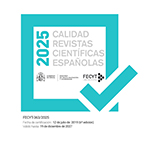New perspectives in feminist methodological research
Resumen
Se han escrito muchas páginas acerca de un tema tan necesario y complejo como es el de las metodologías feministas, y en muchas ocasiones se han plasmado esas aportaciones en esta misma revista. Hay varios factores importantes que contribuyen a que se siga prestando atención a este tema desde hace ya décadas. En primer lugar, las metodologías feministas han recibido atención teórica y aplicaciones prácticas en la mayoría de los campos de investigación, tales como la medicina, el derecho, las ciencias políticas, la historia, la sociología, la lingüística, los estudios cinematográficos y de medios de comunicación, entre muchos otros. En segundo lugar, la labor desarrollada en el terreno de la investigación y del conocimiento feministas han transformado las principales disciplinas académicas, desplazando la atención hacia temas anteriormente infravalorados o descuidados, y cambiando las prioridades y los enfoques en aquellos que ya se habían estudiado anteriormente. La investigación feminista ha alterado de manera decisiva nuestra comprensión del mundo, y ha influido en los propios procedimientos a través de los cuales se aborda la investigación. Esto ha sido así no solo en el campo del feminismo, sino entre quienes investigan desde el rigor académico y siguen los dictados del estado del arte y quieren estar al día en los avances en sus respectivos campos de estudio están necesariamente al tanto de las metodologías feministas. Una tercera razón muy significativa para la atención prestada a los métodos feministas es que las investigadoras y los investigadores que se dedican a este tipo de trabajo mantienen un fuerte compromiso que se materializa en un esfuerzo continuo para ampliar los límites y definiciones de valores tales como la igualdad, la interseccionalidad, el cambio social y los desafíos éticos encaminados a promover la justicia social, particularmente en lo referente al mantenimiento de los privilegios y las relaciones de poder. A partir del compromiso orientado a investigar las voces y experiencias de las mujeres y cuestionar las dicotomías de género, los métodos feministas han ido más allá de estas prioridades iniciales para ir avanzando al ampliar los límites de significado que estos conceptos e ideas sugieren.
Descargas
Descarga artículo
Licencia
La revista Investigaciones Feministas, para fomentar el intercambio global del conocimiento, facilita el acceso sin restricciones a sus contenidos desde el momento de su publicación en la presente edición electrónica, y por eso es una revista de acceso abierto. Los originales publicados en esta revista son propiedad de la Universidad Complutense de Madrid y es obligatorio citar su procedencia en cualquier reproducción total o parcial. Todos los contenidos se distribuyen bajo una licencia de uso y distribución Creative Commons Reconocimiento 4.0 (CC BY 4.0). Esta circunstancia ha de hacerse constar expresamente de esta forma cuando sea necesario. Puede consultar la versión informativa y el texto legal de la licencia.











